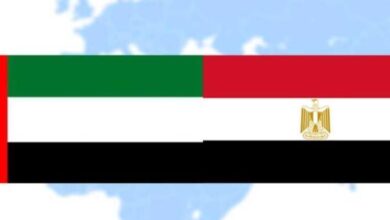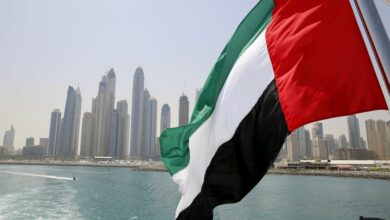DUBAI — Days before his overthrow, President Hosni Mubarak received a senior visitor from the United Arab Emirates, one of several Gulf monarchies long supportive of the most Arab populous country and its veteran strongman.
What transpired between Mubarak and Foreign Minister Sheikh Abdallah bin Zayed al-Nahayan is not known, beyond the fact that a letter from UAE ruler Sheikh Khalifa bin Zayed al-Nahayan was delivered.
But the significance of the 8 February 2011 visit was clear: It was a gesture of understanding and concern for a longtime friend who had been a trusted diplomatically for most Gulf Arabs, not least in their confrontation with non-Arab Iran.
Fast forward to 2013, and the picture is starkly different.
The Egypt-UAE relationship has been strained by the regional spread of Islamist influence — Egypt now has an elected Islamist president — with implications not only for the two protagonists, but all Arab states hit by the uprisings against dictators and dynasties that began two years ago.
Poorer, densely populated Arab states like Egypt often look to Gulf states for investment and financing, as well as overseas work for their nationals, a need ever more acute with rulers under unprecedented pressure to produce jobs and services.
The UAE, home to about 380,000 Egyptian expatriates and a major investor in Egypt, pledged US$3 billion in aid to Cairo in 2011. But the funds have not yet been transferred, an Egyptian source familiar with the matter told Reuters, mainly due to the political instability in post-revolution Egypt.
A break in relations between the Arab political heavyweight and the Gulf financial powerhouse would be unthinkable. But the unfamiliar chill in their dealings reflects an increasingly complicated relationship between these two groups of countries.
Gulf states historically have sent aid and investment to less moneyed fellow Arabs, and in return have received diplomatic support and sometimes military protection.
The Egypt-UAE spat "does have a huge bearing on the success of the Arab transitions," said Jane Kinninmont of the British think tank Chatham House.
"Here you have a number of countries which are going through transitions but which have huge economic needs. The obvious place for them to look is the wealthy Gulf Arab countries," said Kinninmont.
Huge economic needs
Arab countries received 62 percent of all Gulf aid from 1970 to 2008, according to a study by researchers Bessma Momani and Crystal Ennis in the Cambridge Review of International Affairs.
For its part, the UAE needs to tread a careful line, analysts say.
Aggravating Egypt's Muslim Brotherhood could also affect UAE relations with other countries, like Syria, where Islamists are playing a major role in the revolt against President Bashar al-Assad.
And irking Egypt's new rulers could also push Cairo closer to Shia Iran, arch-adversary of the Gulf Arabs.
Gulf Sunni Muslim rulers fear that, despite being a Sunni group itself, the Brotherhood is soft on Iran, unlike Mubarak.
"The Emirates recognize that Egypt's centrality in Arab affairs is an important counter to Iran," said Frederic Wehrey, Middle East program senior associate at Carnegie Endowment for International Peace think tank.
Gulf Arab states need a prosperous Egypt for a host of reasons, not least to protect their own investments.
But history shows that financial help from the region sometimes reflects shifts in the diplomatic climate — even if governments insist their assistance is not political.
For example, Jordan's ties with Gulf were hurt in 1990 when it refused to join an alliance against Iraq after it invaded Kuwait. Many Palestinians and Jordanians lost jobs in the Gulf where they enjoyed welfare state benefits as expatriate workers.
There are implications, too, for Gulf Arab states. Most saw Mubarak's fall as the result of a US decision to cast adrift an erstwhile ally and common adversary of Iran, rather than an acceptance of an unstoppable revolution.
Crucially, Gulf Arab rulers alarmed by Mubarak's ouster were further disconcerted by the subsequent ascent to power of the Muslim Brotherhood, Mubarak's sworn foe and a group once cited in a US diplomatic cable as the UAE's "mortal enemy."
If Washington was ready to deal with the Muslim Brotherhood in Cairo, could it do the same in the Gulf, if a new democratic dispensation swept away the region's tradition of princely rule?
Anxiety
There is no shortage of evidence of UAE worries about the reach of Islamists. On 27 January, the UAE announced 94 of its citizens would go on trial on charges of seeking to seize power, accusing them of being in communication with the Brotherhood.
Many are believed to be members of Al-Islah, an Islamist group suspected of links to the Brotherhood, a movement founded in Egypt in 1928 and which is banned in the Gulf Arab state. Islah says it has no connection to the global Brotherhood.
Some analysts say the arrests are meant to send a message that Islamist activities will not be tolerated, rather than reflecting a belief they pose a significant security threat.
"The UAE has a rule: zero tolerance for political organizations of any sort whether Islamists or non-Islamists, and these guys [Emiratis and Egyptians] broke the law. Pure and simple," UAE political scientist Abdel Khaleq Abdallah said.
But the UAE has continued to strike a firm tone in public.
In October, Sheikh Abdallah, the foreign minister, said: "The Muslim Brotherhood does not believe in the nation state. It does not believe in the sovereignty of the state."
An Emirati source close to the government said the minister's comments were directed at the Brotherhood, not Egypt, and the UAE saw the bilateral relationship as a strategic one.
On 1 January, a local newspaper reported that the UAE had also arrested 11 Egyptians on suspicion of training Islamists in how to overthrow governments.
The Brotherhood replied by saying the 11 were wrongfully arrested. Local media in the UAE said the Gulf Arab states had rejected a subsequent request by Cairo to free the detainees.
For its part, the Brotherhood has sought to reassure Gulf Arabs it has no plan to push for political change beyond Egypt's borders. Egyptian President Mohamed Morsy has said there is no plan to "export the revolution" — comments welcomed by the UAE.
Both Egypt and the UAE publicly assert that they have a special relationship. After all, Sheikh Abdallah had a meeting with Morsy, whose roots are in the Brotherhood, in Egypt in September 2012 and delivered an invitation for him to visit the UAE. A response is awaited.
Periods of strain
And yet the discordant tone will stir questions over Gulf Arab willingness to make good on promises of support to Egypt, which desperately needs funds to avert financial crisis.
While Gulf Arabs have pledged large sums to Egypt, helping stabilize its currency, they are motivated by their own interests, Richard LeBaron, a former US ambassador to Kuwait, wrote in a study for the Atlantic Council think tank.
He said most Gulf Arab states, wary of the Brotherhood, had adopted a "wait and see" attitude toward new leaders in Egypt and Tunisia before committing significant additional funds and seemed not to sense any urgency in making such decisions.
Carnegie Endowment's Wehrey wrote that while Egypt-UAE ties could face more turbulence, matters could be resolved due to shared interests including a need to counter Iranian influence and the Brotherhood's need for Gulf investment.
"A key first step is for both sides to avoid strident and provocative statements that fuel the rancor that currently afflicts the relationship," he said.


